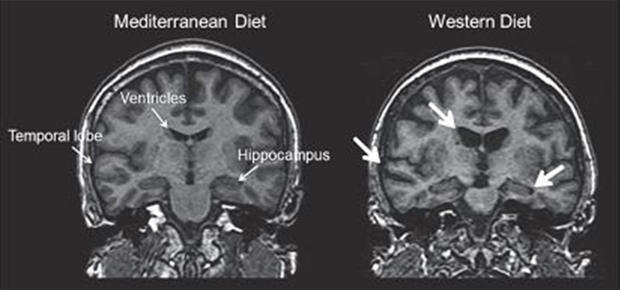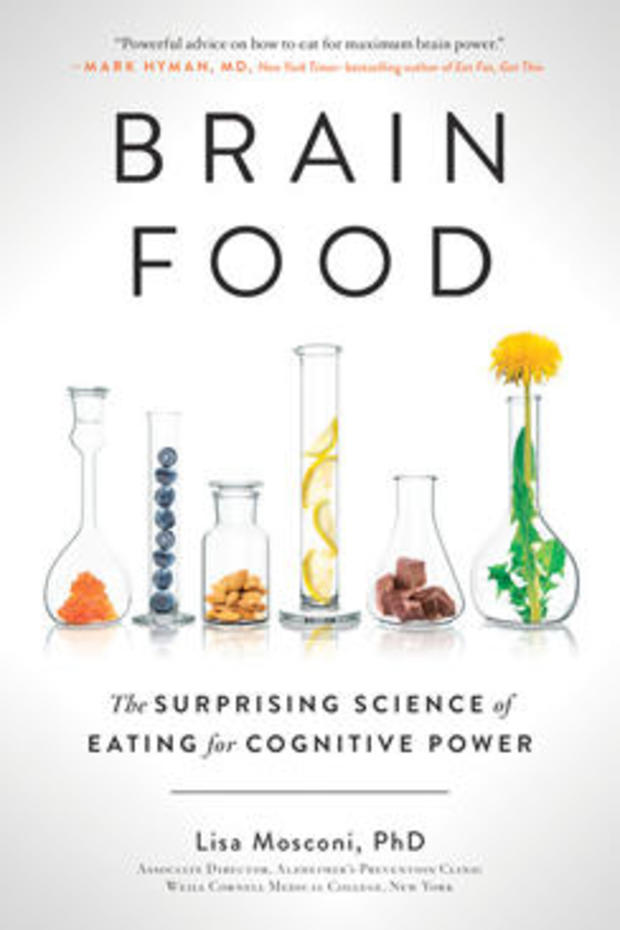Excerpt from "Brain Food": Comparing brains on different diets
In her book "Brain Food: The Surprising Science of Eating for Cognitive Power" (Avery), Lisa Mosconi, a neuroscientist and integrative nutritionist, and the associate director of the Alzheimer's Prevention Clinic at Weill Cornell Medical College in New York, writes about the dietary needs of the brain, and about approaching cognitive health through nutrition.
Read the excerpt below, and don't miss Dr. Mosconi talking "brain food" on "CBS Sunday Morning" November 24!
Comparing brains on different diets: Mediterranean diet vs. Western diet
The figure below shows the MRI scans of two healthy, dementia-free people following very different diets. Let's check out the differences between them.
To the left, you can see the brain of a fifty-two-year-old woman who's been on a Mediterranean-style diet most of her life. Not being a neuroscientist, you might not be able to recognize this at first glance, but her brain looks great. In fact, that's a picture of exactly how you want your brain to look when you are fifty-two. First of all, her brain takes up most of the space inside the skull (the white ribbon that surrounds the brain in the figure). The ventricles, those little butterfly shaped fissures in the middle of the brain, are small and compact. The hippocampus (the memory center of the brain) is well rounded and in close contact with the surrounding tissues.
In comparison, the scan on the right shows the brain of a slightly younger fifty-year-old woman who's been eating a Western-style diet for many years. This means fast foods, processed meats, dairy, refined sweets, and sodas. The arrows point to brain atrophy, or shrinkage, an indicator of neuronal loss. As the brain loses neurons, the space is replaced by fluids, which show up as black on an MRI. As you can see, there are more black areas present in the brain that has been fed a typical Western diet than in the brain that consumed a Mediterranean diet. The butterfly-shaped ventricles are larger in the brain to the right, which results from the brain shrinking. The hippocampus itself is surrounded by fluid (in black), as is the temporal lobe, another region directly involved in memory formation. These are all signs of accelerated aging and increased risk of future dementia.
Of course, not all people on the Mediterranean diet have perfectly healthy brains, and not all people who eat fast food have brains that are deteriorating. But on average, people who follow a Mediterranean diet seem to have overall fitter brains than those on less healthy diets, regardless of whether or not they carry genetic risk factors for dementia.
Findings such as these have led to a true and proper paradigm shift in medical practice, as an increasing number of experts now see diet as being as important to mental health as it is to physical health. In particular, there is mounting evidence that adopting a brain-healthy diet is key to maintaining optimal cognitive capacities well into old age, therefore delaying, or, even better, preventing the appearance of debilitating diseases like Alzheimer's. At the same time, eating well and leading a healthy lifestyle have the added benefits of reducing the risk and severity of other medical illnesses that also affect the brain, such as heart disease, diabetes, and various metabolic disorders.
In the end, science is teaching us that our brain health is highly dependent on the food choices we make. Though genetics can predispose us to many forms of disease, we should also give ourselves a little more credit when it comes to controlling the health of our brains (and bodies). What we all can and should do is be sure to take care of the brains we've been so gracefully given by nourishing them the best ways possible, which will naturally extend our chances of a longer, healthier life.
Reprinted from "Brain Food: The Surprising Science of Eating for Cognitive Power" by arrangement with Avery, an imprint of Penguin Publishing Group, a division of Penguin Random House LLC. Copyright © 2018, Lisa Mosconi, Ph.D.
For more info:
- "Brain Food: The Surprising Science of Eating for Cognitive Power" by Lisa Mosconi, Ph.D. (Avery), in Hardcover, Trade Paperback, eBook and Audio formats, available via Amazon
- lisamosconi.com





